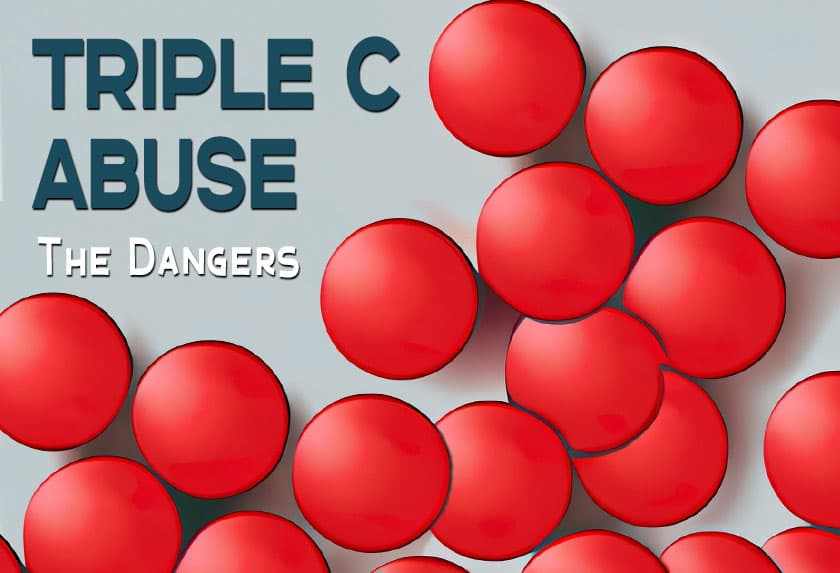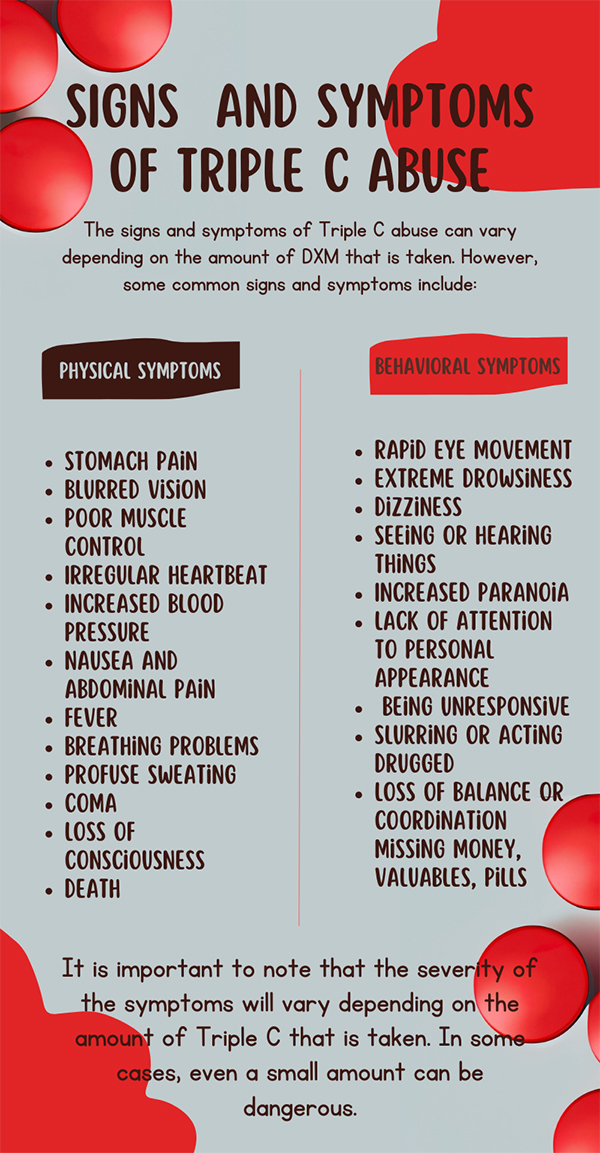Triple C is a slang term for the over-the-counter medication Coricidin HBP Cough & Cold, which contains dextromethorphan (DXM). DXM is a dissociative drug that can produce hallucinations, euphoria, and other mind-altering effects. When taken in large doses, DXM can be dangerous and even fatal.
What Does Triple C Look Like?
Triple C is a red, round tablet that is sold in a box of 24. The tablets have the Coricidin logo on them. Triple C also contains acetaminophen, which is a pain reliever and fever reducer.
- Size: Triple C tablets are red, round, and about 1 cm in diameter.
- Shape: Triple C tablets are round and flat.
- Color: Triple C tablets are bright red.
- Logo: Triple C tablets have the Coricidin logo stamped on them.
It is important to note that Triple C tablets may also be sold in other forms, such as capsules or liquid. However, the red, round tablets are the most common form of Triple C.
The Dangers
Triple C abuse can lead to a number of serious health problems, including:
- Overdose: Taking too much DXM can lead to a coma or even death.
- Toxic psychosis: Repeatedly taking high doses of DXM can cause a mental condition called toxic psychosis, which is characterized by delusions, hallucinations, and impaired judgment.
- Liver damage: Triple C also contains acetaminophen, which can damage the liver if taken in high doses.
- Kidney damage: Triple C can also damage the kidneys, especially if it is taken with other drugs that are toxic to the kidneys.
- Heart problems: Triple C can cause heart problems, such as an irregular heartbeat and high blood pressure.
- Seizures: Triple C can cause seizures, especially in people who have a history of seizures.
- Death: Triple C overdose can be fatal.
According to the National Institute on Drug Abuse, an estimated 12,000 people are treated in emergency rooms each year for DXM-related problems. Of these, an estimated 100 people die.
It is important to note that these are just some of the health problems that can be caused by Triple C abuse. There are many other potential health problems that can occur, depending on the amount of DXM that is taken and the individual’s health history.
Signs and Symptoms of Triple C Abuse
The signs and symptoms of Triple C abuse can vary depending on the amount of DXM that is taken. However, some common signs and symptoms include:
- Physical symptoms:
- Stomach pain
- Blurred vision
- Poor muscle control
- Irregular heartbeat
- Increased blood pressure
- Nausea and abdominal pain
- Fever
- Breathing problems
- Profuse sweating
- Coma
- Loss of consciousness
- Death
- Behavioral symptoms:
- Rapid eye movements
- Extreme drowsiness
- Dizziness
- Seeing or hearing things that are not there
- Increased paranoia
- Lack of attention to personal appearance or grooming
- Falling asleep and being unresponsive
- Slurring or acting drugged
- Loss of balance or coordination
- Missing money, valuables, pills
It is important to note that the severity of the symptoms will vary depending on the amount of Triple C that is taken. In some cases, even a small amount can be dangerous.
Here are some additional signs and symptoms that may indicate Triple C abuse:
- Empty cough medicine packaging in the trash
- Missing products from the medicine cabinet
- Declining grades
- Hostility and uncooperativeness
- Changes in personality
- Financial problems
If you notice any of these signs or symptoms, it is important to talk to the person about your concerns. You can also seek help from a healthcare professional or a drug treatment center.
Treatment for Triple C Abuse
There are a number of treatment options available, including:
- Detoxification: This involves gradually withdrawing from DXM under medical supervision.
- Rehabilitation: This involves therapy and counseling to help people overcome their addiction to DXM.
- Support groups: There are a number of support groups available for people who are struggling with DXM addiction.
Prevention
The best way to prevent Triple C abuse is to educate yourself and your children about the dangers of this drug. You should also talk to your doctor about the risks of taking DXM, even in the recommended doses.
If you or someone you know is struggling with Triple C abuse, please seek help from a qualified professional. There is help available, and you don’t have to go through this alone.
Here are some resources that can help:
- The National Institute on Drug Abuse: https://www.drugabuse.gov/
- The Substance Abuse and Mental Health Services Administration: https://www.samhsa.gov/
- The National Alliance on Mental Illness: https://www.nami.org/
- The National Council on Alcoholism and Drug Dependence: https://www.ncadd.org/






